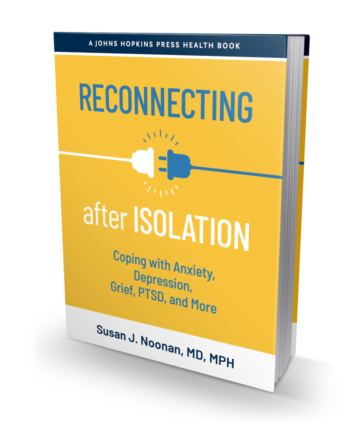It came up in a conversation I had recently that with depression, bipolar disorder, or other longstanding mental illness, feeling better, or “good,” may feel alien and uncomfortable. At least at first. For this reason some of us have an underlying fear of getting better, a fear of recovery. How can this be? Isn’t that the ultimate goal, to feel better?
First, you have to remind yourself that fears are feelings, surrounded by unhelpful thoughts; they are not facts. That takes some of the power away from them. You can learn to manage your feelings of fear of getting better just as any other feelings in your life. As you do so, pay attention to the strong effects of fear, as it can get in the way of your recovery.
When you are immersed in an illness like depression or bipolar disorder for a long time, the illness causes you to have a view of yourself and adopt certain behaviors that then become familiar. It becomes a sense of “normal,” where you know how to do “that”. Feeling “good” is new and different and may feel uncomfortable at first. You are not used to it and may feel anxious or irritable. The depressed brain sees feeling good as different and “not right” so the tendency is to go back, back to the thoughts, feelings and behaviors of depression or anxiety. Feeling depressed may feel safer and more comfortable than risking the new territory of wellness, which has a new set of feelings, thoughts, behaviors and expectations. But wait, let’s think about this for a minute.
What exactly is recovery? One way to think about it is that recovery is the ongoing process of gaining control over your life after receiving a psychiatric diagnosis and all losses associated with that diagnosis, such as the loss of friendships or financial savings. Recovery has been defined by SAMHSA (Substance Abuse and Mental Health Services Administration) as “a process of change through which individuals improve their health and wellness, live a self-directed life, and strive to reach their full potential” (SAMHSA, 2011). This implies that recovery is something do-able, an ongoing process where you have a say in defining what your own improvement will look like and be. This is good.
Recovery also means leaving the familiar illness and “life as you know it now” behind, venturing into the world of wellness that is uncertain and unfamiliar to you. That can be scary. You might feel anxious, irritable, feel like retreating back to your old depressed self. You don’t know what to expect, especially if you’ve had trouble remembering what you were like before the depression began. So some people may feel more comfortable keeping things as they are, staying with the familiar. I urge you not to do this.
When depression symptoms improve or go away, some might fear that you’d be leaving a hole in the way you think and act and view the world, believing that you won’t know how to course through life in any different way. You will, though, because along the way you will have learned to replace the depression symptoms with a more positive view of yourself and the world, and then you can approach life more confidently.
It takes a lot of work to get better. There is major effort required, and energy you feel you may not always have. So you have to push yourself, push yourself beyond this, and eventually you will adjust to the idea of feeling better. After all, this is your ultimate goal. Don’t give up on yourself!
Here are some easy steps to help you better recognize your fears and address them. Write your answers down on a piece of paper and think about it for a little while…
- Identify your fear
- Think about how it makes you feel (afraid, anxious, etc.)
- What are the thoughts you have associated with your fear?
- What are the benefits of staying in your old comfort zone?
- What are the costs of staying in your old comfort zone?
- Identify a few small steps to help you confront these feelings and negative thoughts
- Identify the support people you need to help you face your fear
- Begin with a few of the small steps you just identified
Stay well!
This article previously appeared on my blog on View From the Mist on Psychology Today at https://www.psychologytoday.com/blog/view-the-mist/201608/fear-recovery

